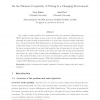Free Online Productivity Tools
i2Speak
i2Symbol
i2OCR
iTex2Img
iWeb2Print
iWeb2Shot
i2Type
iPdf2Split
iPdf2Merge
i2Bopomofo
i2Arabic
i2Style
i2Image
i2PDF
iLatex2Rtf
Sci2ools
127
click to vote
IOR
2011
2011
On the Minimax Complexity of Pricing in a Changing Environment
We consider a pricing problem in an environment where the customers’ willingness-to-pay (WtP) distribution may change at some point over the selling horizon. Customers arrive sequentially and make purchase decisions based on a quoted price and their private reservation price. The seller knows the WtP distribution pre- and post-change, but does not know the time at which this change occurs. The performance of a pricing policy is measured in terms of regret: the loss in revenues relative to an oracle that knows the time of change prior to the start of the selling season. We derive lower bounds on the worst case regret and develop pricing strategies that achieve the order of these bounds, thus establishing the complexity of the pricing problem. Our results shed light on the role of price experimentation, and its necessity for optimal detection of changes in market response / WtP. Our formulation allows for essentially arbitrary consumer WtP distributions, and purchase request patterns....
| Added | 14 May 2011 |
| Updated | 14 May 2011 |
| Type | Journal |
| Year | 2011 |
| Where | IOR |
| Authors | Omar Besbes, Assaf J. Zeevi |
Comments (0)

